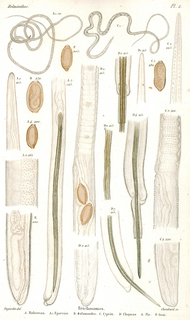Biology:Helminthology


Helminthology is the study of parasitic worms (helminths). The field studies the taxonomy of helminths and their effects on their hosts.
The origin of the first compound of the word is the Greek ἕλμινς - helmins, meaning "worm".
In the 18th and early 19th century there was wave of publications on helminthology; this period has been described as the science's "Golden Era". During that period the authors Félix Dujardin,[1] William Blaxland Benham, Peter Simon Pallas, Marcus Elieser Bloch, Otto Friedrich Müller,[2] Johann Goeze, Friedrich Zenker, Charles Wardell Stiles, Carl Asmund Rudolphi, Otto Friedrich Bernhard von Linstow[3] and Johann Gottfried Bremser started systematic scientific studies of the subject.[4]
The Japanese parasitologist Satyu Yamaguti was one of the most active helminthologists of the 20th century; he wrote the six-volume Systema Helminthum.[5][6]
See also
References
- ↑ Dujardin, Félix (1845). "Histoire naturelle des helminthes ou vers intestinaux". Librairie Encyclopédique de Roret. doi:10.5962/bhl.title.10123.

- ↑ Müller, Otto Frederik (1773). Vermivm terrestrium et fluviatilium, seu, Animalium infusoriorum, helminthicorum et testaceorum, non marinorum, succincta historia / auctore Othone Friderico Müller. 2. doi:10.5962/bhl.title.46299. https://www.biodiversitylibrary.org/item/100154.
 , Biodiversity Heritage Library
, Biodiversity Heritage Library
- ↑ Linstow, Otto Friedrich Bernhard von (1878). Compendium der Helminthologie. Ein Verzeichniss der bekannten Helminthen, die frei oder in thierischen Körpern leben, geordnet nach ihren Wohnthieren, unter Angabe der Organe, in denen sie gefunden sind, und mit Beifügung der Litteraturquellen. doi:10.5962/bhl.title.1406. https://www.biodiversitylibrary.org/item/16281.

- ↑ Ernst, Maurice. (1910). Oxyuris vermicularis (the threadworm). A treatise on the parasite and the disease in children and adults, together with the particulars of a rapid, harmless and reliable cure. doi:10.5962/bhl.title.22359. https://www.biodiversitylibrary.org/bibliography/22359.

- ↑ Anonymous. 1983. Special edition: A list of papers by Dr. Satyu Yamaguti and his collaborators and a notice on their distribution. The Meguro Parasitological Museum News, 153 (58), 1-12. PDF

- ↑ Google Scholar: papers and books authored by Satyu Yamaguti and their citations
 |
